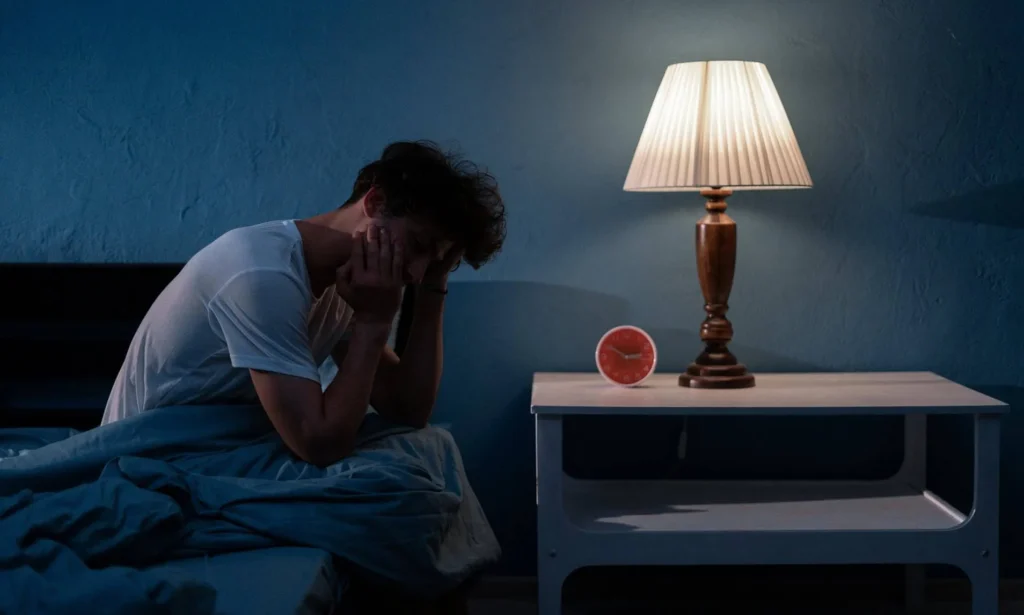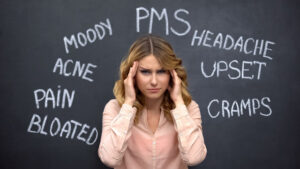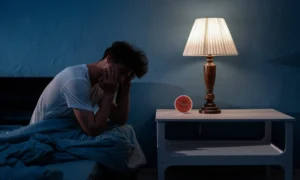Lying in bed with a racing mind while sleep remains frustratingly out of reach affects millions of people worldwide. This condition, known as sleep anxiety, creates a challenging cycle where worry about sleeping makes falling asleep even more difficult.
Sleep anxiety is a feeling of stress or fear about going to sleep that can manifest as racing thoughts, physical restlessness, or even panic attacks at bedtime. Research shows that most people with mental health disorders like anxiety experience some form of sleep disruption. The condition affects adults, teens, and children alike, often developing alongside other sleep disorders or mental health conditions.
Understanding the root causes and triggers of sleep anxiety provides the foundation for breaking free from sleepless nights. Effective strategies range from cognitive behavioral therapy techniques to lifestyle adjustments that can help restore healthy sleep patterns and reduce nighttime worry.
What Is Sleep Anxiety?
Sleep anxiety creates a cycle where worry about sleep leads to more sleep problems, affecting millions of people who experience fear and stress around bedtime. This condition manifests through specific symptoms and operates differently from traditional insomnia.
Defining Sleep Anxiety
Sleep anxiety is a specific type of anxiety disorder characterized by intense worry, fear, or stress about the ability to fall asleep or stay asleep throughout the night. Unlike general anxiety that occurs during waking hours, this condition specifically targets the sleep process itself.
People with sleep anxiety often develop anticipatory fear about bedtime. They may begin worrying hours before sleep time about whether they will be able to rest properly. This creates a heightened state of alertness that directly contradicts the relaxation needed for healthy sleep.
The condition involves both emotional and physical responses to sleep-related thoughts. The mind becomes preoccupied with sleep performance, while the body responds with stress hormones that make sleep even more elusive.
Sleep anxiety can develop suddenly or gradually over time. It often emerges following periods of high stress, major life changes, or after experiencing several consecutive sleepless nights.
How Sleep Anxiety Differs From Insomnia
While sleep anxiety and insomnia frequently occur together, they represent distinct conditions with different underlying mechanisms. Understanding these differences helps in identifying appropriate treatment approaches.
Primary Differences:
| Sleep Anxiety | Insomnia |
|---|---|
| Fear-based difficulty sleeping | Physical inability to sleep |
| Worry about sleep performance | General sleep disruption |
| Anxiety triggers sleep problems | Sleep problems may cause anxiety |
| Psychological symptoms predominate | Physical symptoms more prominent |
Insomnia refers to the actual inability to fall asleep, stay asleep, or achieve restorative sleep despite having adequate opportunity for rest. It can stem from various causes including medical conditions, medications, or environmental factors.
Sleep anxiety specifically involves the fear and worry about not being able to sleep. A person might have perfect sleep conditions but still struggle because their mind creates anxiety around the sleep process itself.
The two conditions often reinforce each other, creating a problematic cycle where sleep anxiety leads to insomnia, which then increases anxiety about future sleep.
Common Symptoms of Sleep Anxiety
Sleep anxiety symptoms manifest in three main categories: emotional, physical, and behavioral responses that occur primarily around bedtime or during nighttime hours.
Emotional and Mental Symptoms:
- Racing thoughts about sleep or daily concerns
- Feelings of dread or panic when approaching bedtime
- Inability to concentrate on relaxing activities
- Sense of impending doom about the upcoming night
- Irritability and nervousness in evening hours
Physical Sleep Anxiety Symptoms:
- Rapid heartbeat or palpitations
- Muscle tension and restlessness
- Sweating or feeling hot despite comfortable temperature
- Shallow or rapid breathing patterns
- Digestive discomfort or nausea
Behavioral Patterns:
- Avoiding the bedroom or delaying bedtime
- Repeatedly checking the clock throughout the night
- Engaging in stimulating activities to avoid sleep attempts
- Seeking reassurance from others about sleep concerns
Some individuals experience nocturnal panic attacks, which are intense episodes of fear that occur specifically at night and can wake them from sleep. These attacks often include physical symptoms like chest pain, shortness of breath, and overwhelming fear.
The symptoms typically worsen over time without treatment, as each difficult night reinforces the anxiety cycle for future sleep attempts.
Causes and Triggers of Sleep Anxiety
Sleep anxiety develops through a complex interaction of psychological, physical, and environmental factors that create and reinforce patterns of nighttime distress. Understanding these underlying causes helps identify why some people develop persistent worry around sleep while others rest peacefully.
Psychological Factors That Drive Sleep Anxiety
Anxiety disorders form the foundation for most sleep-related fears. People with generalized anxiety disorder often carry their daytime worries into the bedroom. The quiet nighttime environment amplifies racing thoughts about work, relationships, or health concerns.
Perfectionism plays a significant role in sleep anxiety development. Individuals who demand perfect sleep performance create unrealistic expectations. When they don’t fall asleep within their expected timeframe, they become frustrated and more anxious.
Past traumatic experiences can trigger sleep anxiety in specific situations. Someone who experienced a panic attack at night may develop anticipatory anxiety about sleeping. This creates a learned fear response that activates each bedtime.
Overthinking and rumination patterns intensify during nighttime hours. Without daytime distractions, the mind focuses on problems and potential threats. This mental hyperactivity directly opposes the relaxation needed for sleep onset.
Control issues contribute to sleep anxiety when people feel powerless over their sleep quality. The more they try to force sleep, the more elusive it becomes. This perceived lack of control feeds anxiety and creates additional sleep pressure.
Physical and Environmental Contributors
Medical conditions frequently cause sleep anxiety through physical discomfort or biochemical changes. Hyperthyroidism releases excess thyroid hormones that increase heart rate and create restlessness. Sleep disorders like sleep apnea cause frequent awakenings that generate anxiety about sleep quality.
Environmental factors disrupt natural sleep patterns and trigger anxiety responses. Common contributors include:
- Temperature extremes that prevent comfortable rest
- Noise pollution from traffic, neighbors, or electronics
- Light exposure from streetlights or device screens
- Uncomfortable bedding or mattress issues
- Partner disturbances like snoring or movement
Caffeine and stimulant consumption creates physiological arousal that interferes with sleep initiation. Alcohol initially seems relaxing but causes sleep fragmentation and early morning anxiety. Certain medications, particularly steroids and some antidepressants, can increase nighttime alertness.
Hormonal fluctuations during menstruation, pregnancy, or menopause alter sleep patterns and increase anxiety sensitivity. Cortisol levels that remain elevated during evening hours prevent the natural wind-down process necessary for sleep.
The Anxiety-Stress-Sleep Cycle
Stress and anxiety create a self-perpetuating cycle that worsens over time. Initial sleep difficulties generate worry about sleep loss consequences. This worry increases stress hormones like cortisol and adrenaline, which further impair sleep quality.
The anticipatory anxiety begins hours before bedtime. People start worrying in the afternoon about whether they’ll sleep well that night. This early activation of the stress response system makes relaxation increasingly difficult.
Sleep deprivation from previous nights increases emotional reactivity and anxiety sensitivity. The tired brain struggles to regulate emotions and perceives threats more intensely. This heightened anxiety state makes quality sleep even more unlikely.
Performance anxiety around sleep creates additional pressure that backfires. The harder someone tries to fall asleep, the more alert they become. This effort-based approach to sleep directly contradicts the passive surrender required for natural sleep onset.
Each poor night reinforces negative beliefs about sleep ability. People develop catastrophic thinking patterns about sleep loss consequences. These thoughts become automatic triggers that activate the stress response when approaching bedtime.
How Sleep Anxiety Impacts Sleep Quality
Sleep anxiety creates a cascade of problems that directly interfere with both falling asleep initially and maintaining restful sleep throughout the night. This creates a self-perpetuating cycle where poor sleep quality worsens anxiety symptoms, leading to even greater sleep disruption.
Difficulty Falling or Staying Asleep
People with sleep anxiety often experience significant difficulty falling asleep as their minds race with worries about the upcoming night. Racing thoughts about work, relationships, or daily stressors keep the brain in a state of hyperarousal when it should be winding down.
The physical symptoms compound the problem. Increased heart rate, muscle tension, and rapid breathing make it nearly impossible to achieve the relaxed state necessary for sleep onset.
Those who do manage to fall asleep frequently struggle to stay asleep throughout the night. Anxiety can cause multiple awakenings, leaving individuals awake at night for extended periods. Each awakening often triggers renewed worry about not getting enough rest.
Sleep becomes fragmented and unrefreshing. Even after spending eight hours in bed, people may feel as though they barely slept at all due to frequent disruptions.
How Poor Sleep Feeds Anxiety
Poor night’s sleep directly amplifies anxiety symptoms the following day. Sleep deprivation affects the brain’s emotional regulation centers, making individuals more reactive to stress and less able to cope with daily challenges.
The prefrontal cortex, responsible for rational thinking and emotional control, functions poorly without adequate rest. This creates heightened sensitivity to anxiety triggers that might normally be manageable.
Problems with sleep also increase worry about future nights. Anticipatory anxiety develops as bedtime approaches, with individuals dreading another night of tossing and turning.
The cycle intensifies over time. Each poor night of sleep increases anxiety levels, which in turn makes the next night’s sleep even more elusive. This bidirectional relationship creates a persistent loop that becomes increasingly difficult to break.
Long-Term Effects on Health
Chronic sleep anxiety severely impacts overall quality sleep, leading to sustained sleep debt that affects multiple body systems. The immune system weakens, making individuals more susceptible to illness and slower to recover from infections.
Cognitive function deteriorates with ongoing sleep disruption. Memory consolidation, concentration, and decision-making abilities all suffer when sleep affects daily functioning consistently.
Physical health consequences include increased risk of cardiovascular disease, diabetes, and weight gain. The body’s stress hormone cortisol remains elevated, contributing to inflammation and metabolic dysfunction.
Mental health deteriorates as sleep anxiety persists. Depression rates increase significantly among those with chronic sleep disturbances, creating additional layers of psychological distress that further complicate treatment efforts.
Practical Strategies to Overcome Sleep Anxiety
Sleep anxiety responds well to targeted interventions that address both the physical and mental aspects of bedtime stress. The most effective approaches combine consistent sleep habits, proven relaxation methods, environmental optimization, and professional support when needed.
Building Healthy Sleep Habits and Routines
A consistent sleep schedule forms the foundation for overcoming sleep anxiety. Going to go to bed and waking up at the same time every day helps regulate the body’s internal clock, making sleep more predictable and less anxiety-provoking.
Sleep hygiene practices create structure around bedtime. These include avoiding caffeine after 2 PM, limiting alcohol consumption, and stopping nicotine use several hours before sleep.
Key sleep hygiene elements:
- Fixed bedtime and wake time (even on weekends)
- 7-8 hours of sleep opportunity nightly
- No screens 1 hour before bed
- Light dinner 3-4 hours before sleep
- Regular exercise (but not within 4 hours of bedtime)
A wind-down routine signals the brain that sleep is approaching. This routine should begin 30-60 minutes before the intended sleep time. Activities like reading, gentle stretching, or listening to calm music help transition from wakefulness to rest.
Evidence-Based Relaxation Techniques
Progressive muscle relaxation systematically reduces physical tension that fuels sleep anxiety. This technique involves tensing muscle groups for 5-10 seconds, then releasing and focusing on the relaxation sensation.
Progressive muscle relaxation sequence:
- Start with toes and feet
- Move to calves and thighs
- Progress to abdomen and chest
- Continue with hands and arms
- Finish with shoulders, neck, and face
Deep breathing exercises slow heart rate and activate the parasympathetic nervous system. The 4-7-8 technique involves inhaling for 4 counts, holding for 7, and exhaling for 8 counts.
Mindfulness meditation helps break the cycle of anxious thoughts at bedtime. Focusing on breath, body sensations, or guided imagery redirects attention away from worries. Regular practice during the day strengthens this skill for nighttime use.
Optimizing the Sleep Environment
The bedroom environment directly impacts sleep anxiety levels. Temperature control is crucial – the optimal range is 65-68°F (18-20°C). A room that’s too warm can increase restlessness and anxiety.
Environmental factors for better sleep:
| Factor | Optimal Condition | Impact |
|---|---|---|
| Temperature | 65-68°F | Promotes natural body cooling |
| Darkness | Complete or near-complete | Supports melatonin production |
| Noise | Under 30 decibels | Prevents sleep disruption |
| Humidity | 30-50% | Maintains comfort |
Blackout curtains, eye masks, and white noise machines create consistent conditions. The bed should be reserved primarily for sleep and intimacy to strengthen mental associations between the bedroom and rest.
Comfortable bedding reduces physical discomfort that can trigger anxiety. This includes a supportive mattress, appropriate pillows, and breathable fabrics that regulate temperature throughout the night.
When to Seek Professional Help
Sleep medicine specialists can identify underlying conditions contributing to sleep anxiety. Sleep studies may reveal sleep apnea, restless leg syndrome, or other disorders that worsen nighttime anxiety.
Professional intervention becomes necessary when sleep anxiety persists despite consistent self-help efforts for 3-4 weeks. Additional warning signs include daytime impairment, panic attacks at bedtime, or avoidance of sleep altogether.
Cognitive behavioral therapy for insomnia (CBT-I) addresses thought patterns that maintain sleep anxiety. This structured approach typically shows improvement within 4-6 weeks and provides long-term benefits without medication dependence.
Healthcare providers at facilities like Big Apple Medical Care can evaluate whether sleep anxiety stems from underlying medical conditions or medication side effects. They can coordinate care between primary care, mental health, and sleep specialists.
Medication options may include short-term sleep aids or anti-anxiety medications. However, these work best when combined with behavioral strategies rather than as standalone treatments.
Frequently Asked Questions
Sleep anxiety affects millions of people and raises specific questions about symptoms, treatments, and coping strategies. Understanding the physical signs, natural remedies, and practical techniques can help individuals find effective solutions for better sleep.
What are the common symptoms of sleep anxiety?
Sleep anxiety symptoms include racing thoughts, rapid heartbeat, muscle tension, sweating, restlessness, and difficulty falling asleep due to worry about sleep itself.
What natural remedies can help calm anxiety at night?
Natural remedies include deep breathing exercises, progressive muscle relaxation, chamomile tea, maintaining a cool sleep environment, and establishing a consistent bedtime routine.
What strategies can help overcome sleep anxiety?
Effective strategies include cognitive behavioral therapy for insomnia, limiting caffeine intake, creating a sleep-friendly environment, practicing relaxation techniques, and maintaining regular sleep schedules.
How can one manage sleep when also dealing with anxiety and depression?
Managing sleep with anxiety and depression requires treating underlying conditions through therapy, medication if needed, regular exercise, stress management, and consistent sleep hygiene practices.
What tips are available for those experiencing a rush of anxiety when trying to fall asleep?
Tips include using the 4-7-8 breathing technique, practicing mindfulness meditation, avoiding screens before bed, keeping a worry journal, and focusing on present-moment sensations rather than anxious thoughts.
How do you cope with fear at night that prevents you from sleeping?
Coping with nighttime fear involves identifying specific triggers, using grounding techniques, keeping a dim nightlight if needed, practicing relaxation exercises, and seeking professional help when fear persists for months.







